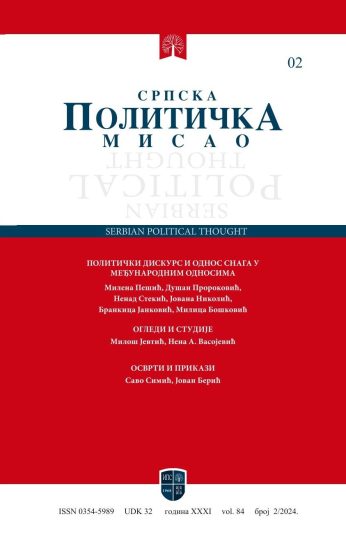Main topic
LAW AND POLITICS
REFLECTIONS ON LEGAL NIHILISM
Abstract
In the text of the paper, legal nihilism is understood as a selective, arbitrary and informal political-command implementation of law that results in its abuse. Political actors, judicial officials and citizens are detected as legal nihilists and all of them are characterized by deficient legal consciousness, which is reflected in the disrespect or relativization of legal norms and values incorporated into them. Following theoretical considerations of legal nihilism as a manifestation of non-legal consciousness, the practical side of this phenomenon is portrayed primarily through the Russian and secondarily through the Serbian archetype. It is concluded that legal nihilism occurs in the contexts of legal uncertainty, authoritarian tendencies, and omnipresent political-cultural matrix. Paradigmatic examples include Russia and Serbia as states where the rule of law and the ethos of civic obligations have never truly taken root.
Legal nihilism turns the judiciary into a politically dependent category that circumvents the juridical logic. The criminal, political, corrupt and informal behavior of the justice deliberator is manifested in all sorts of manifestations such as the de facto purchase of court decisions, selective and false investigations (false suing, prosecution of innocents) and prosecutor’s failure to act.
Reducing nihilistic sentiment primarily depends on decision makers’ capacity to build institutions of trust, credibility and integrity. The contribution of citizens as private actors who will refrain from seeking rents as well as public officials seeking a bribe following the process of democratization should not be ignored. When the order to invest in legal activities comes to life, legal nihilism will be consequently reduced, as “the most unpleasant of all guests”.
References
- Bowring, Bill. 2009. “Legal nihilism in Russia.” openDemocracy. 7 July 2009. https://www.opendemocracy.net/en/legal-nihilism-in-russia/.
- Dworkin, Ronald. 1986. Law’s Empire. Cambridge: Harvard University Press.
- Guastini, Riccardo. 2013. „Redefinicija pravnog realizma.” Revus 19 (1): 83−96.
- Hendley, Kathryn. 2012. “Who Are the Legal Nihilists in Russia?”. Post Soviet Affairs 28 (2): 149−186. doi: 10.2747/1060-586X.28.2.149.
- Huskey, Eugene. 1991. “A Framework for the Analysis of Soviet Law.” Russian Review 50 (1): 53–70. doi: 10.2307/130211.
- Karklins, Rasma. 2005. System Made Me Do It: Corruption in Post-communist Societies. New York: M. E. Sharpe.
- Karklins, Rasma. 2007. Sistem me je naterao: Korupcija u postkomunističkim društvima. Beograd: OEBS.
- Klinger, William, i Denis Kuljiš. 2019. Titov tajni imperij. Beograd: JP Službeni glasnik.
- Ledeneva, Alena. 2013. Can Russia Modernise? Sistema, Power Networks and Informal Governance. Cambridge: Cambridge University Press.
- Ministarstvo pravde. n. d. „Radni tekst amandmana Ministarstva pravde na Ustav Republike Srbije.” Poslednji pristup 10. januar 2020. godine. https://www.mpravde.gov.rs/files/amandmani%20za%20objavljivanje1.pdf.
- Nonet, Philippe, and Philp Selznick. 1978. Law and Society in Transition: Toward Responsive Law. New Jersey: Transaction Publishers.
- Perić, Tijana. 2012a. „Ogled o političkoj korupciji.” Srpska politička misao 37 (3): 345−364. doi: 10.22182/spm.3732012.14.
- Perić, Tijana. 2012b. „Politika i sudstvo.” Politička revija 31 (1): 67−77. doi: 10.22182/pr.3112012.4.
- Perić Diligenski, Tijana. 2018. „Politička korupcija i klijentelizam – per genus et differentiam.” U Zbornik radova sa Sabora politikologa Konstitucionalizam i ustavni dizajn u demokratskoj recesiji, ur. Biljana Đorđević, 343−356. Beograd: Udruženje za političke nauke Srbije.
- Pound, Roscoe. 1940. Contemporary juristic theory. Pomona College, Scripps College, Claremont Colleges.
- Provost, René. 2015. “Teetering on the Edge of Legal Nihilism: Russia and the Evolving European Human Rights Regime.” Human Rights Quarterly 1: 1−77. doi: 10/2139/ssrn.2282680.
- Rehder, Britta. 2007. “What is Political about jurisprudence? Courts, Politics and Political Science in Europe and the United States.” MPIfG Discussion Paper 7 (5): 5−24.
- Service, Robert. 2005. “Soviet Political Leadership and ‘Sovietological’ Modelling.” In Leading Russia: Putin in Perspective Essays in Honour of Archie Brown, ed. Alex Pravda, 59−74. Oxford: Oxford University Press.
- Shepard, Randall T. 2002. “Telephone Justice, Pandering and Judges, Who Speak Out of School.” Urban Law Journal 29 (3): 811−825.
- Singer, Joseph William. 1984. “The Player and the Cards: Nihilism and Legal Theory.” Yale Law Journal 94 (1): 3−70.
- Solomon, Peter H. Jr. 2007. “Informal Practices in Russian Justice: Probing the Limits of Post-Soviet Reform.” In Russia, Europe, and the rule of law, ed. Ferdinand J.M. Feldbrugge, 79−91. Leiden: Brill Nijhoff.
- Stanković Pejnović, Vesna. 2014. Lavirint moći Politička filozofija Fridriha Ničea. Novi Sad: Mediterann Publishing.
- Stanković, Vladan. 2018. „Srpski identitet, politička kultura i odnos prema institucijama.” U Identitet, politička kultura, institucije, ur. Vladan Stanković, 119‒139. Beograd: Institut za političke studije.
- Trochev, Alexei. 2009. “All Appeals Lead to Strasbourg? Unpacking the Impact of the European Court of Human Rights on Russia.” Demokratizatsiya 17 (2): 145–178.
- Tyler, Tom R. 2006. Why People Obey the Law. New Jersey: Princeton University Press.
- Ustav Republike Srbije, „Službeni glasnik Republike Srbije”, br. 98/06.
- Глухарева Ивановна, Людмила. 2016. «Игра в праве как фактор правового нигилизма в России.» Последњи приступ 24. децембар 2019. https://economics.rsuh.ru/jour/article/viewFile/32/33.
- Малахов Петрович, Валерий. 2013. Мифы современной общеправовой теории. Москва: Юнити-Дана Закон и право.


